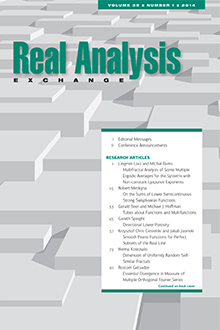Abstract
It was shown in \cite{B} and \cite{Ke} that if \(F(x)\) and \(\Psi(x)\) are Riemann integrals of the form \(\int_a^x f\text{dx}\) and \(\int_b^x \psi \text{dx}\) resp., then \(\psi\cdot f\circ\Psi\), if defined, is Riemann integrable. Furthermore, the change of variable formula applies, giving \(\int_b^x \psi\cdot f\circ\Psi \, \text{dx} = F(\psi(x))-F(\psi(b))\). It is natural to try to generalize this theorem to the Kurzweil-Henstock integral (this question was also dealt with in a paper by the author \cite{Be}); in other words, assuming that \(F\) and \(\Psi\) are KH integrals of \(f\) and \(\psi\) resp., one would expect that \(\psi\cdot f\circ\Psi\) be KH integrable. We show in this paper that this is false, and produce a counterexample based on the middle-third Cantor set and some rudiments of fractal geometry. In other words, by a well known theorem, we prove that the composition of two ACG functions needs not be ACG (in fact, we prove more generally that the composition of two absolutely continuous functions needs not be ACG). Of course, examples that show that the composition of two absolutely continuous functions needs not be absolutely continuous exist in the context of the Lebesgue integral, but since KH integrals need not be absolutely continuous, one cannot infer from these examples the validity of the above claim in the context of KH integration. On the other hand, the subtle method developed in this paper seems to be new, is entirely constructive, and we believe it could be applied to other interesting constructions. \vskip 0pt plus 10pt
Citation
Michael Bensimhoun. "A Counterexample for the Change of Variable Formula in KH Integrals." Real Anal. Exchange 36 (2) 491 - 498, 2010/2011.
Information





